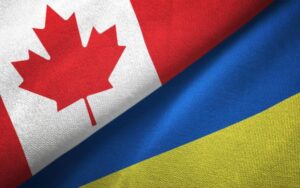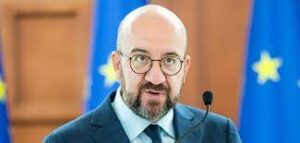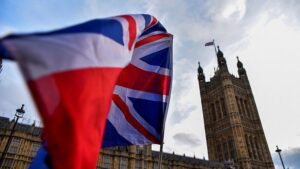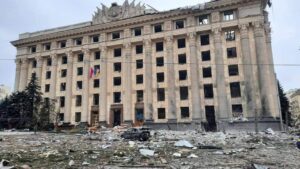
The leader of the Conservative Party of Canada, Pierre Poilievre, said that his future government would transfer frozen Russian assets worth $22 billion to Ukraine, the official website of the Conservative Party of Canada reported on Friday.
According to Poilievre, these funds will be used to support Ukraine in its fight against Russian aggression, as well as to restore infrastructure after the destruction caused by the war.
“The Conservatives have always been proud to support our Ukrainian allies… The Conservatives were the first to introduce the Sergei Magnitsky Act, which made it possible to impose sanctions on Russian oligarchs after Putin’s illegal and unprovoked invasion of Crimea,” Poilievre said.
He reminded that Moscow’s war against Ukraine did not begin in 2022, but almost eight years earlier. After that, the Conservative government of Stephen Harper sent troops to Ukraine as part of Operation UNIFIER and helped to expel Russia from the G8.
Poillevre criticized the current Liberal government for its inaction on the transfer of frozen assets, emphasizing that the Conservatives would act quickly.
“Three hours after the start of the full-scale Russian invasion of Ukraine, I spoke at a rally of the Ukrainian community in Ottawa: ‘Canadians stand in full solidarity with you, and we will always be with you. Three years later, our commitment has not wavered. Glory to Ukraine,” Poilievre said.
Early parliamentary elections in Canada are scheduled for April 28. The Conservatives are currently in opposition.
Earlier, the Experts Club think tank released a video analysis on the most important elections in the world in 2025, see more here – https://youtu.be/u1NMbFCCRx0?si=vtEMJXzfMcggWsD2
Source: https://interfax.com.ua/

The Helsinki District Court has satisfied the petition of Naftogaz Ukrainy and five other companies of the group and seized certain assets owned by Russia in Finland, the company’s press service said on Monday. According to its data, it is about real estate and other assets, which are estimated at tens of millions of dollars.
“This decision is part of Naftogaz’s global strategy to recover compensation for the damage caused by the seizure of assets of group companies in Crimea in accordance with the decision of the Hague arbitration,” the report said.
The company specified that this is also the first publicly known successful seizure of assets outside of Ukraine in fulfillment of the arbitral award on cases on claims of Ukrainian companies to Russia because of the expropriation of property in Crimea in 2014.
The decision is an interim step towards the actual recovery of assets in favor of Naftogaz. At the same time, interest stipulated for non-payment of funds under the arbitration award continues to accrue until the compensation is paid in full.
“Since Russia refuses to voluntarily pay Naftogaz the funds stipulated by the Hague ruling, we continue to use all available mechanisms to recover them. Today we have stood one step closer to restoring justice. At the same time, we are taking active steps to enforce the arbitration award in other target jurisdictions where there are Russian assets,” the head of the group, Oleksiy Chernyshev, said.
In Finland, Naftogaz is being represented pro bono by attorneys Mikko Leppa and Tatu Jaarinen of HPP Attorneys, supported by Covington & Burling, acting as lead legal counsel to coordinate Naftogaz’s international enforcement efforts.
As reported, in October 2016, Naftogaz and its subsidiaries initiated arbitration proceedings against Russia for damages due to the seizure of their assets in Crimea, and in September 2017 an application was filed with the tribunal at the Court of Justice in The Hague.
The Arbitration Tribunal at the Permanent Court of Arbitration in The Hague in April 2023 ordered the Russian Federation to pay Naftogaz Ukrainy $5 billion for damages caused by the seizure of assets of Naftogaz group companies in Crimea in 2014.

Japan plans to provide Ukraine with $3.3bn in support loans using interest from frozen Russian assets, Kyodo has quoted diplomatic sources as saying.
According to the sources, during the summit, G7 members agreed to allocate a total of $50 billion to support Ukraine.
The US and the EU are expected to allocate $20 billion each, while Japan, Britain and Canada will “share” the remaining $10 billion.
The G7 plans to start implementing the project by the end of this year.

European Council President Charles Michel assures that concrete steps to use the proceeds from frozen Russian assets will be taken very quickly so that the first 1 billion euros will be allocated to Ukraine, including for military aid, as early as July 1 this year.
“We have taken a very important decision by making it possible to postpone unexpected revenues – and this is a proposal from the European Commission – and we are determined to act very quickly so that we can take some of this money to support Ukraine, including the possibility of (supporting) military equipment. This demonstrates that the 27 leaders who were around the table understand the gravity of the situation,” he said Thursday in Brussels at a news conference after the European Council meeting.
Michel is convinced that the necessary steps to make the mechanism work will be taken “very quickly”. “These proposals were presented by the Commission yesterday. There is considerable support in the European Council for this approach,” the European Council president said.
According to Michel, the Belgian presidency confirmed that it too “intends to work with all colleagues very quickly”. “This is really very important because there will be more opportunity to support Ukraine with military equipment, with what is urgently needed,” he emphasized.
European Commission President Ursula von der Leyen, in turn, said she was pleased that the leaders had approved the use of emergency revenues from immobilized Russian assets. “This will provide funding to supply Ukraine with military equipment. We can expect to be able to raise €3 billion in 2024 and a similar amount in future years… There is strong support to use the windfall revenues from immobilized assets for military support to Ukraine. I told the leaders that if we act quickly to finalize our proposals, we can disburse 1 billion as early as July 1. The assets are in our hands and if we are quick, there will be concrete actions in the summer,” she explained.
CHARLES MICHEL, EUROPEAN COUNCIL, MILITARY AID, RUSSIAN ASSETS, UKRAINE

The UK authorities are considering the possibility of confiscating frozen Russian assets in the kingdom for transfer to Ukraine, reports The Guardian.
According to the newspaper, British Foreign Secretary Liz Truss said that the UK intends to follow the example of Canada and seize the assets of Russians in the United Kingdom in order to transfer them to Ukraine.
“I support this concept. We are following it very closely. Canadians have actually just passed a law that we are working on with the Home Office and the Treasury, but I certainly agree with this idea. We just need to work out all the details of this issue “, – quotes Truss edition.
She noted that the British Parliament “most likely” will need to pass a new law that allows this to happen. However, the minister added, perhaps it will be possible to do without it.
The newspaper notes that the seized funds can be transferred either to private individuals in the form of damages, or to the Ukrainian authorities.

Canadian Foreign Affairs Minister Mélanie Joly has said the federal government of Canada will change its sanctions law to allow seized and sanctioned foreign assets to be redistributed as compensation to victims or to help in rebuilding a foreign state from war, the Canadian Broadcasting Corporation (CBC) has reported.
“Today, we are seeking the capacity to not only seize but to allow for the forfeiture of the assets of sanctioned individuals and entities and to allow us to compensate victims with the proceeds… These changes would make Canada’s sanctions regime the first in the G7 to allow these actions,” Joly said in a statement on Tuesday.
The CBC said that Canada is among a number of countries to have imposed sanctions on Russia after it invaded Ukraine on February 24. The changes that Canada aims to bring to its sanctions law will mean that funds or property seized from Russia could be paid out to help rebuild Ukraine or go to those affected by Russia’s invasion.
The text of the bill says the seized assets can be used for “the reconstruction of the foreign state adversely affected by a grave breach of international peace and security.” The funds could also be used for “the restoration of international peace and security” and to compensate victims when that security is breached.
A similar bill that would allow Canada to seize and confiscate Russian assets for the purpose of supporting victims of Russian attacks was already tabled by Sen. Ratna Omidvar and is poised to be approved by the upper chamber.
According to the CBC, the Ukrainian Embassy to Canada has urged lawmakers to quickly enact Omidvar’s bill. “We believe it is absolutely fair that Russian state property or ill-gotten assets of Russian oligarchs must become a part of reparations by the aggressor state to the victim of the aggression… By passing the Bill S-217 Canada will demonstrate leadership and could set an example for others to follow and show that the Russian kleptocratic corrupt regime will pay the full cost of its crimes against Ukraine,” the embassy said in a statement.